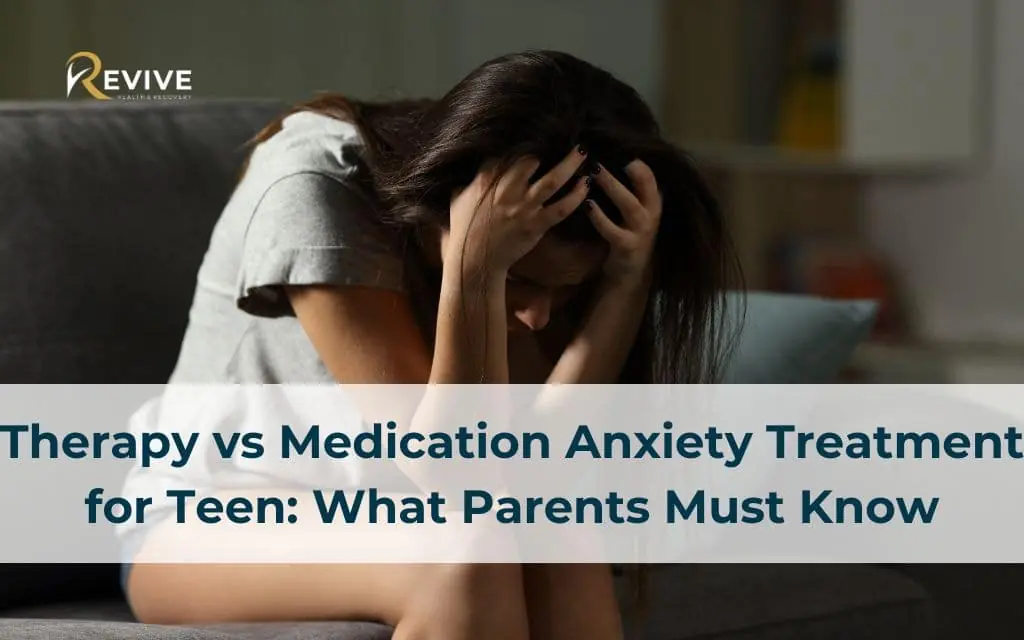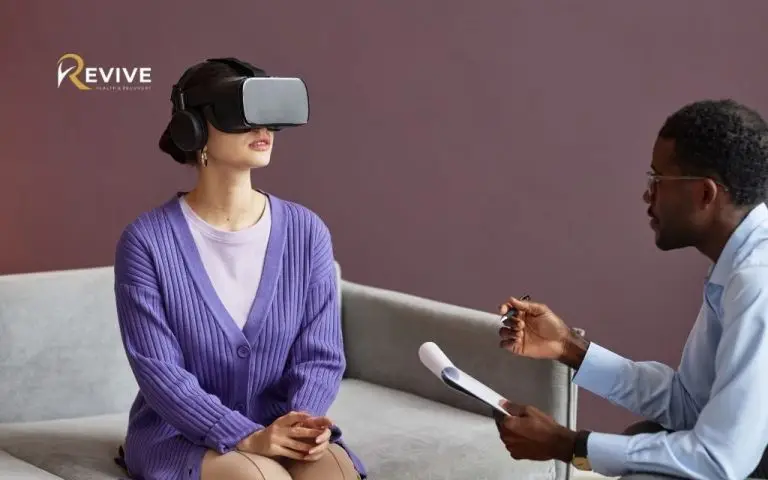You notice your teen suddenly avoiding school activities they once loved. They complain of stomachaches before social events. Sleep patterns have changed, and homework that once took an hour now consumes their evening. Could this be anxiety? So What Anxiety treatment for teens is okay?
According to the National Institute of Mental Health (NIMH), 31.9% of adolescents experience an anxiety disorder – making it the most common mental health challenge facing today’s youth. In Denver, where academic pressure, social media influence, and pandemic effects continue to impact teen mental health, families need accessible, effective solutions.
This guide explores anxiety symptoms, evidence-based treatments, Denver resources, and practical steps to support your teen through recovery.
Understanding Teen Anxiety
What is Anxiety in Teens?
Anxiety in adolescents extends beyond normal worry into persistent fear that interferes with daily functioning. It manifests in various forms – generalized anxiety disorder (GAD), social anxiety, panic disorder, and specific phobias – each with distinct characteristics but all sharing the core experience of overwhelming dread or fear.
The American Academy of Child and Adolescent Psychiatry (AACAP) notes that while occasional anxiety represents a normal response to stress, clinical anxiety disorders persist, intensify over time, and significantly impact academic performance, social development, and family relationships.

Symptoms to Watch For
Anxiety presents differently in teens than adults. Key indicators include:
Emotional Signs:
- Excessive worry about everyday matters
- Irritability or unexplained anger
- Restlessness or feeling “on edge”
- Catastrophic thinking (“Everyone will laugh at me”)
Physical Manifestations:
- Frequent headaches or stomachaches without medical cause
- Unexplained fatigue
- Muscle tension
- Sleep disturbances (insomnia or hypersomnia)
Behavioral Changes:
- Avoidance of social situations or school
- Declining grades or perfectionism
- Difficulty concentrating
- Reassurance-seeking behaviors
Why Teen Anxiety Differs and need Anxiety treatment for Teens
Adolescent anxiety requires specialized approaches because teens navigate unique developmental challenges. Their brains—particularly the prefrontal cortex responsible for rational decision-making—continue developing into their mid-20s. Meanwhile, the emotional centers mature earlier, creating an imbalance that amplifies anxiety responses.
Social dynamics also play a central role. For teens, peer acceptance represents a primary developmental need, making social anxiety particularly debilitating during these years. Digital connection through social media adds complexity, creating both support systems and potential sources of comparison and stress.
Causes and Triggers of Teen Anxiety
Environmental Factors
Several external circumstances contribute to the rising rates of anxiety among Denver teens:
Academic Pressure: Competitive college admissions and high-stakes testing create performance pressure. Denver’s high-achieving school districts may inadvertently intensify these expectations.
Social Media: Constant connectivity exposes teens to curated images of peers’ lives, fostering unhealthy comparison. Studies show correlations between screen time and anxiety symptoms.
Societal Uncertainty: Economic pressures, climate concerns, and political polarization create background stress that affects developing minds.
These environmental triggers offer context for understanding natural ways to treat teen anxiety by addressing root causes rather than just symptoms.
Biological Factors
Genetics significantly influence anxiety susceptibility. Research indicates that 30-40% of anxiety disorder risk stems from hereditary factors. Teens with parents experiencing anxiety disorders face higher vulnerability.
Neurobiology also plays a role. Differences in neurotransmitter functioning – particularly serotonin, GABA, and norepinephrine – affect how the brain processes potential threats. Some teens naturally experience heightened amygdala activity, creating stronger fear responses.
Trauma and Stress
Exposure to traumatic events – whether acute (accidents, violence) or chronic (household dysfunction, neglect) – significantly increases anxiety risk. Denver’s youth face varied stressors, from typical developmental challenges to specific community pressures.
Even positive changes – switching schools, parental remarriage, or moving to a new neighborhood – create adjustment demands that may trigger anxiety in vulnerable teens.

Types of Anxiety Disorders in Teens
Generalized Anxiety Disorder (GAD)
GAD involves persistent, excessive worry about multiple life areas. Teens with GAD often anticipate disaster, overthink decisions, and seek perfectionism. Physical symptoms like tension headaches, fatigue, and digestive issues commonly accompany this condition.
In Denver schools, these students may appear high-functioning academically while internally struggling with overwhelming worry about grades, social acceptance, and family matters.
Social Phobia
Social anxiety disorder – affecting approximately 9% of adolescents – centers on intense fear of judgment or humiliation in social situations. Teens with this condition may:
- Avoid class participation
- Experience panic before presentations
- Struggle with ordering food in restaurants
- Decline social invitations despite loneliness
For Denver teens seeking anxiety treatment for social phobia, specialized cognitive-behavioral approaches focusing on gradual exposure prove particularly effective.
Panic Disorder
Characterized by recurrent panic attacks – sudden episodes of intense fear accompanied by physical symptoms like racing heart, chest pain, and shortness of breath – panic disorder often develops in adolescence. The unpredictability of these attacks leads to “fear of fear” where teens modify behaviors to avoid situations where attacks previously occurred.
Separation Anxiety
Though more commonly associated with younger children, separation anxiety can persist or emerge during adolescence. Teens with this disorder experience excessive fear when separated from parents or home environments, potentially refusing school attendance or independent activities.
Effective Anxiety treatment for Teens
Cognitive Behavioral Therapy (CBT)
Cognitive Behavioral Therapy stands as the gold standard for treating adolescent anxiety disorders. This structured approach helps teens identify thought patterns that contribute to anxiety and develop effective strategies to challenge and change these patterns.
Key benefits of CBT for teen anxiety in Denver include:
- Evidence-based effectiveness: Multiple studies demonstrate CBT’s superiority for anxiety reduction
- Practical skill-building: Teens learn concrete coping mechanisms applicable beyond therapy
- Long-term results: Skills acquired typically maintain or improve after treatment ends
- Minimal side effects: Unlike medication, CBT carries virtually no physical side effects
- Family involvement: Parents learn supportive techniques reinforcing progress
Denver providers typically deliver CBT through weekly sessions over 12-16 weeks, with homework assignments between meetings to reinforce skills.
Other Evidence-Based Therapies
While CBT forms the foundation of most treatment plans, several other approaches show promise:
Acceptance and Commitment Therapy (ACT) teaches teens to accept unavoidable anxiety while committing to valued activities despite discomfort.
Dialectical Behavior Therapy (DBT) combines CBT techniques with mindfulness and emotional regulation strategies, particularly helpful for teens with co-occurring conditions.
Exposure Therapy gradually introduces anxiety-provoking situations in controlled environments, allowing teens to build tolerance and confidence.
Denver programs increasingly incorporate these approaches based on individual needs and responses.

Medication
For moderate to severe anxiety, medication may complement psychotherapy. Selective Serotonin Reuptake Inhibitors (SSRIs) represent the primary pharmacological treatment for adolescent anxiety, with FDA approval for obsessive-compulsive disorder and evidence supporting their use for other anxiety disorders.
Medication decisions require careful consideration of:
- Potential benefits versus side effects
- Adolescent brain development
- Family preferences
- Monitoring requirements
Denver providers typically recommend starting with therapy alone, adding medication when symptoms significantly impair functioning or prevent therapy engagement.
Holistic Approaches
Complementary approaches enhance traditional treatments for many teens:
- Mindfulness practices teach present-moment awareness, reducing rumination about past or future concerns.
- Physical exercise reduces anxiety through neurochemical changes, with research supporting regular moderate activity as comparable to medication for mild-moderate anxiety.
- Nutritional considerations address connections between gut health and mental wellness, with evidence suggesting omega-3 fatty acids, complex carbohydrates, and fermented foods may support anxiety management.
- Sleep hygiene targets the bidirectional relationship between sleep disturbance and anxiety symptoms.
Denver’s integrative providers often incorporate these elements into comprehensive treatment plans.
Comparing All Anxiety treatment for Teens
Therapy vs. Medication
When weighing treatment approaches, consider these factors:
| Therapy (CBT-focused) | Medication (typically SSRIs) |
| Develops lasting skills | Provides symptom relief |
| No physical side effects | Potential side effects (sleep disturbance, GI issues) |
| Weekly time commitment | Daily administration |
| Results develop gradually | Some effects within 2-4 weeks |
| Addresses root cognitive patterns | Targets neurochemical imbalances |
Research indicates combined approaches often yield superior outcomes for moderate-severe anxiety, while therapy alone suffices for mild-moderate cases.
Outpatient vs. Intensive Outpatient Programs (IOP)
Treatment intensity should match symptom severity:
Traditional outpatient therapy (weekly 45-50 minute sessions) works well for most teens with anxiety who maintain functioning in school and relationships.
Intensive Outpatient Programs provide structured treatment several days weekly for teens experiencing significant functional impairment. Denver IOPs typically offer 3-4 hour sessions 3-5 days weekly, incorporating individual therapy, group work, and family components.
Revive Health Recovery offers both levels of care, allowing seamless transitions as teens progress.
Traditional vs. Holistic Approaches
While evidence-based therapies form the foundation of effective treatment, integrative approaches enhance outcomes for many teens. Denver providers increasingly offer combined models incorporating:
- Traditional CBT techniques
- Mindfulness and meditation practices
- Body-based interventions (yoga, progressive muscle relaxation)
- Nutritional guidance
- Sleep optimization
- Nature-based activities leveraging Colorado’s outdoor resources
Local Resources Anxiety treatment for Teens in Denver
Revive Health Recovery – Best Anxiety treatment for Teens
Revive Health Recovery provides comprehensive adolescent anxiety treatment through evidence-based approaches personalized to each teen’s unique needs. Our services include:
- Specialized teen anxiety programs addressing the full spectrum of anxiety disorders with developmentally appropriate techniques.
- Family-centered approach recognizing parents as essential partners in recovery through education, skills training, and support.
- Flexible treatment options including in-person and telehealth sessions accommodating busy family schedules.
- Experienced adolescent specialists trained specifically in youth anxiety interventions.
Contact Revive Health Recovery at (303) 268-4655 or visit our location at 1427 S Federal Blvd, Denver, CO 80219 to schedule a consultation.
Other Top Therapists and Centers
Denver offers several high-quality providers specializing in adolescent anxiety:
- Anxiety Solutions of Denver provides specialized exposure therapy programs for teens with social anxiety and specific phobias.
- Vivid Psychology Group offers innovative Virtual Reality Treatment allowing teens to practice anxiety-provoking situations in controlled environments.
- Denver Springs provides higher levels of care including partial hospitalization when outpatient treatment proves insufficient.
Reviews of teen anxiety treatment programs in Denver consistently highlight the importance of therapist specialization in adolescent development.
Cost of Therapy in Denver
Understanding financial considerations helps families plan effectively:
- Average session costs for CBT for teen anxiety in Denver range from $120-200 for individual therapy, with initial assessments typically higher.
- Insurance coverage varies significantly, with many Denver providers accepting major plans and offering insurance billing assistance.
- Sliding scale options exist at several community clinics and training institutions.
- Teen mental health scholarships through local foundations occasionally provide financial assistance for families demonstrating need.
Overcoming Teen Resistance to Therapy
How to Talk to Your Teen
Approaching the therapy conversation requires sensitivity:
- Choose a neutral, private moment without distractions
- Use “I” statements expressing concern rather than labeling (“I’ve noticed you seem more withdrawn” versus “You’re being anxious”)
- Normalize therapy as a resource like tutoring or sports coaching
- Involve teens in the selection process, giving appropriate choice and control
- Address misconceptions about what therapy involves
When to Step In
While teen participation improves outcomes, parental intervention becomes necessary when:
- Anxiety significantly impairs functioning (school refusal, social isolation)
- Physical symptoms persist without medical cause
- Sleep disturbance becomes chronic
- Self-medication with substances occurs
- Suicidal thoughts or self-harm behaviors emerge
In these situations, firmly explaining the non-negotiable nature of getting help while providing appropriate choices within that framework balances teen autonomy with parental responsibility.
Family Involvement
Effective treatment engages the entire family system:
- Parent coaching helps adults modify responses that may inadvertently reinforce anxiety.
- Communication training improves family interactions around anxiety-provoking situations.
- Exposure support teaches parents to appropriately encourage brave behavior rather than accommodation.
Denver providers increasingly offer parallel parent sessions alongside teen treatment to maximize support between appointments.
Finding the Right Therapist for Your Teen
Key Qualities to Seek
The therapist-teen relationship significantly influences outcomes. Look for:
- Adolescent specialization: Training and experience specifically with teens, not just general anxiety treatment
- Evidence-based approaches: Commitment to scientifically-supported methods, particularly CBT
- Engagement skills: Ability to connect authentically with adolescents, balancing authority with rapport
- Parent collaboration philosophy: Clear communication with parents while maintaining appropriate teen confidentiality
- Cultural competence: Understanding of your family’s unique cultural context and values
Denver Therapist Directories
Several resources help families find therapists for anxiety treatment in teens in Denver:
- Psychology Today’s directory allows filtering by specialty, age group, and insurance acceptance.
- Colorado Child and Adolescent Psychiatric Society maintains referral resources for youth mental health providers.
- Denver Public Schools Mental Health Resources offers community partner recommendations.
- Health insurance provider directories typically allow searching by specialty and location.
Signs of a Good Fit
Indicators of an effective therapeutic relationship include:
- Your teen willingly returns after initial sessions
- The therapist balances listening with active intervention
- Clear treatment goals and progress metrics exist
- You observe gradual behavioral changes at home
- Communication maintains appropriate confidentiality while keeping parents informed
- The therapist adjusts approaches based on response rather than rigidly following a protocol
Additional Support and Resources
National Organizations
Reputable information sources include:
National Institute of Mental Health (NIMH) provides research-based fact sheets on adolescent anxiety disorders at nimh.nih.gov.
American Academy of Child and Adolescent Psychiatry (AACAP) offers family resources including symptom checklists and treatment overviews at aacap.org.
Anxiety and Depression Association of America maintains a youth anxiety section with webinars and self-help tools at adaa.org.
Denver Support Groups
Community-based resources complement individual treatment:
Denver Health’s Adolescent Groups provide peer support in structured environments.
NAMI Denver offers family support groups for parents of teens with mental health challenges.
School-based wellness centers at many Denver Public Schools provide on-site support groups.
Expert Insights
Dr. David Anderson, clinical psychologist at the Child Mind Institute, emphasizes: “Teenagers with anxiety need both validation of their experience and tools to face challenges. Treatment works best when we meet teens where they are developmentally—acknowledging their growing autonomy while providing structure.”
Denver adolescent specialists note that Colorado’s outdoor environment offers unique opportunities for nature-based anxiety interventions, with several programs incorporating hiking and outdoor mindfulness into treatment protocols.
FAQs about Anxiety treatment for Teens
What are the signs of anxiety in teens?
Common signs include excessive worry, physical complaints (headaches, stomachaches), sleep disturbances, irritability, avoidance of social situations, and declining grades. Revive Health Recovery provides comprehensive assessments to identify anxiety symptoms in adolescents.
How effective is CBT for teen anxiety?
CBT demonstrates 60-80% effectiveness for adolescent anxiety disorders, making it the gold standard treatment. Revive Health Recovery employs specialized CBT protocols developed specifically for teen anxiety.
What’s the cost of therapy in Denver?
Therapy sessions typically range from $120-200, with many insurance plans covering a portion of costs. Revive Health Recovery accepts most major insurance plans and offers transparent financial counseling.
Are there programs for social phobia in Denver?
Yes, several Denver providers offer specialized social anxiety programs, including Revive Health Recovery’s evidence-based protocol combining CBT, exposure therapy, and social skills training.
How do I find a therapist in Denver?
Start by contacting Revive Health Recovery for a consultation, as our team specializes in adolescent anxiety treatment. Alternatively, use insurance provider directories, Psychology Today listings, or school counselor recommendations.
What if my teen resists therapy?
Resistance is common. Start with a consultation at Revive Health Recovery, where our experienced therapists use engagement strategies specifically designed for reluctant teens, focusing first on building rapport before diving into treatment.
Are there holistic options besides medication?
Yes, Revive Health Recovery integrates evidence-based approaches like mindfulness, physical activity, nutritional guidance, and sleep hygiene into comprehensive treatment plans based on individual needs.
Conclusion
Adolescent anxiety represents one of the most treatable mental health conditions when addressed with appropriate interventions. Denver families have access to exceptional resources combining evidence-based therapies, holistic approaches, and specialized adolescent care.
Early intervention significantly improves outcomes, with research showing that properly treated teens develop resilience skills that serve them throughout adulthood. The journey may require patience, but with appropriate support, teens can learn to manage anxiety and thrive.
Contact Revive Health Recovery today at (303) 268-4655 to start your teen’s journey to relief. Our adolescent anxiety specialists will partner with your family to develop a personalized treatment plan addressing your teen’s unique needs and strengths.



